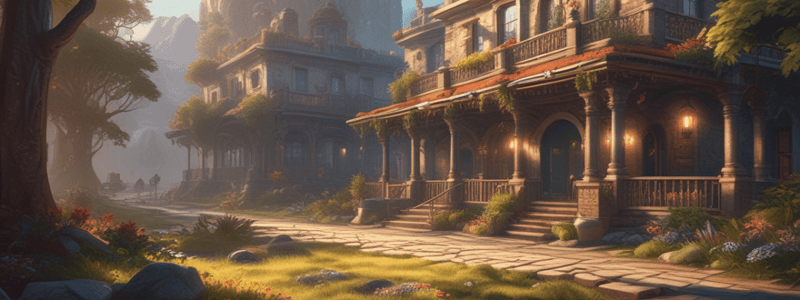Podcast
Questions and Answers
Which of the following is NOT a crucial aspect of game direction in shaping successful video games?
Which of the following is NOT a crucial aspect of game direction in shaping successful video games?
- Defining the game's genre
- Establishing the art style
- Determining the marketing strategy (correct)
- Crafting the storyline
What is the primary challenge associated with managing multiple stakeholders in game direction?
What is the primary challenge associated with managing multiple stakeholders in game direction?
- Ensuring everyone adheres to strict deadlines
- Maintaining consistent artistic vision
- Reaching consensus on critical design choices (correct)
- Resolving conflicts between developers and publishers
Which of the following is NOT a factor that game direction must address when ensuring a positive user experience?
Which of the following is NOT a factor that game direction must address when ensuring a positive user experience?
- Creating emotional connections between characters and players
- Designing engaging content to retain players
- Fostering an environment where players feel invested
- Implementing effective marketing strategies (correct)
What is the primary challenge associated with balancing creativity and profitability in game direction?
What is the primary challenge associated with balancing creativity and profitability in game direction?
Which of the following is NOT a factor that contributes to the challenge of keeping up with changing markets in game direction?
Which of the following is NOT a factor that contributes to the challenge of keeping up with changing markets in game direction?
Which aspect of game direction is primarily responsible for ensuring a smooth and intuitive experience for players?
Which aspect of game direction is primarily responsible for ensuring a smooth and intuitive experience for players?
Which aspect of game development does game direction NOT directly oversee?
Which aspect of game development does game direction NOT directly oversee?
What is the primary purpose of establishing a clear game genre during the direction phase?
What is the primary purpose of establishing a clear game genre during the direction phase?
Which of the following is NOT a key responsibility of game direction?
Which of the following is NOT a key responsibility of game direction?
What is the significance of establishing a defined storyline during the game direction phase?
What is the significance of establishing a defined storyline during the game direction phase?
Which of the following aspects of game development is directly influenced by the game direction phase?
Which of the following aspects of game development is directly influenced by the game direction phase?
What is the primary role of game direction in the overall game development process?
What is the primary role of game direction in the overall game development process?
Flashcards are hidden until you start studying
Study Notes
Introduction
Game direction refers to the process of determining the creative vision and goals for a video game. This includes decisions about its genre, storyline, art style, mechanics, and overall user experience. Game direction involves coordinating various aspects of game development, including game design, programming, art, sound, and testing. In simple terms, game direction sets the tone and guidelines for the game's creation process, ensuring that everyone involved understands the project objectives and works towards achieving them.
Understanding Game Direction
Game direction plays a crucial role in shaping the identity and success of any video game. Here are some key points that illustrate the importance of game direction:
Genre and Storyline
The first step in defining game direction is identifying the game's genre and setting its narrative. This decision depends on the target audience, market trends, and the team's expertise. A clear understanding of the genre helps guide artists and designers in creating characters, locations, and events that fit within the established conventions. Similarly, a defined storyline provides a framework for developers to craft compelling quests and challenges that immerse players in the game world.
Art Style and Character Development
Once the genre and storyline are set, game direction focuses on developing the visual elements of the game. This includes character designs, environment art, animations, and special effects. Consistency across these areas is essential to maintain the game's cohesiveness and immersion. Additionally, game direction ensures that characters are familiar and relatable to the audience, making the game more engaging and enjoyable.
Mechanics and Gameplay
The mechanics and gameplay elements are another critical aspect of game direction. These include combat systems, puzzles, level design, and user interface. Balancing these aspects ensures that the game remains fun and challenging throughout its duration. Moreover, game direction helps developers create a smooth and intuitive experience by addressing issues like difficulty progression, tutorial structure, and accessibility options.
User Experience
Ensuring a positive user experience is paramount in game direction. This includes designing engaging content that encourages players to keep playing. It also involves creating social and emotional connections between characters and players, fostering an environment where players feel invested in their actions and decisions.
Challenges in Game Direction
Game direction can be challenging due to various factors:
Multiple Stakeholders
Video games are complex projects involving numerous stakeholders, including developers, publishers, artists, writers, musicians, voice actors, testers, and more. Each stakeholder has different perspectives, opinions, and priorities, making it difficult to reach consensus on critical design choices. Moreover, keeping everyone aligned throughout the development process requires constant communication and collaboration.
Changing Markets
The video game industry evolves rapidly, with new technologies, platforms, and trends influencing player preferences. As a result, keeping up with market shifts and adapting game direction accordingly poses challenges for game creators. Staying ahead of these changes often requires creative risk-taking, experimentation, and strategic decision-making.
Balancing Creativity and Profitability
Balancing creativity with profitability is another challenge in game direction. Developers must strike a balance between artistic vision and commercial viability while maintaining high production standards. Prioritizing profits over aesthetics or gameplay could lead to disappointment among fans, negatively impacting sales and future prospects.
Conclusion
Game direction plays a vital role in shaping successful video games by defining their genre, storyline, art style, mechanics, and overall user experience. However, it comes with its own set of challenges, such as managing multiple stakeholders, staying updated with changing markets, and balancing creativity and profitability. Despite these hurdles, game direction remains a crucial aspect of game development, guiding teams towards creating engaging, immersive experiences for players.
Studying That Suits You
Use AI to generate personalized quizzes and flashcards to suit your learning preferences.




